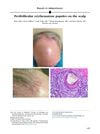 July 2018 in “British Journal of Dermatology”
July 2018 in “British Journal of Dermatology” Hair regrowth was seen in 83% of children with alopecia, immune system plays a role in the condition, and various treatments showed effectiveness for hair and nail disorders.
 April 2018 in “Rheumatology”
April 2018 in “Rheumatology” Alopecia is common in lupus patients, causing significant anxiety and is linked to the disease itself.
 February 2018 in “British Journal of Dermatology”
February 2018 in “British Journal of Dermatology” We need better research to improve alopecia treatment and patient care.

Bovines can have rare inherited skin diseases with specific symptoms like hair loss, fragile skin, and abnormal porphyrin buildup.
 January 2018 in “Springer eBooks”
January 2018 in “Springer eBooks” The document says that early treatment of Acne Vulgaris is important to prevent scarring and that adult onset acne is common in women, often due to hormonal imbalances.
 January 2018 in “The Sewanee Review”
January 2018 in “The Sewanee Review” The poem reflects on hair loss, health concerns, and introspection.
 January 2018 in “Elsevier eBooks”
January 2018 in “Elsevier eBooks” Different nail disorders are treated by targeting their specific causes and using appropriate medications or protective measures.
Eating a lot of soy might lower the chance of early hair loss in men likely to get it.
 August 2017 in “Journal of epidemiological research”
August 2017 in “Journal of epidemiological research” Cancer rates are increasing in developed countries, with estrogen, aging, low vitamin D3, and HPV infection as common causes.
 August 2017 in “International journal of Ayurvedic and herbal medicine”
August 2017 in “International journal of Ayurvedic and herbal medicine” Bhallataka is a poisonous plant that, when detoxified, may have medicinal benefits for various health issues.
 May 2017 in “bioRxiv (Cold Spring Harbor Laboratory)”
May 2017 in “bioRxiv (Cold Spring Harbor Laboratory)” The peach gene pCTG134 helps control the interaction between auxin and ethylene hormones during fruit ripening.

The document explains different types of skin lesions and their characteristics, causes, and related conditions.
 September 2016 in “Elsevier eBooks”
September 2016 in “Elsevier eBooks” Different types of hair loss in dogs and cats have various causes and treatments, with outcomes ranging from good to uncertain.
 July 2016 in “Australasian Journal of Dermatology”
July 2016 in “Australasian Journal of Dermatology” The journal covered various dermatology topics, including treatments, disease management, and research findings.
 April 2016 in “Journal of The American Academy of Dermatology”
April 2016 in “Journal of The American Academy of Dermatology” The booklet increased melanoma patients' knowledge about lymphedema by 13%.
 April 2016 in “Journal of The American Academy of Dermatology”
April 2016 in “Journal of The American Academy of Dermatology” Low-cost videomicroscopes might not be reliable for examining scalp disorders compared to standard methods.
 April 2016 in “Journal of The American Academy of Dermatology”
April 2016 in “Journal of The American Academy of Dermatology” Low-cost videomicroscopy may not be reliable for diagnosing hair loss compared to standard videodermatoscopy.
 April 2016 in “Journal of The American Academy of Dermatology”
April 2016 in “Journal of The American Academy of Dermatology” Low-cost videomicroscopes may not be reliable for diagnosing scalp disorders, smartphones could be reasonable for teledermatology, and U.S. residency programs need more teledermatology training.
 April 2016 in “Journal of The American Academy of Dermatology”
April 2016 in “Journal of The American Academy of Dermatology” The study found that Temporal Triangular Alopecia often starts in early childhood, mainly affects the left side of the scalp, and has no effective treatment except surgery.
 April 2016 in “Journal of The American Academy of Dermatology”
April 2016 in “Journal of The American Academy of Dermatology” The study found that Temporal Triangular Alopecia often starts in early childhood, while Folliculitis Decalvans is characterized by tufted hairs and redness around hair follicles.
 January 2016 in “Journal of The American Academy of Dermatology”
January 2016 in “Journal of The American Academy of Dermatology” The woman has a type of scarring hair loss with red bumps around hair follicles.

The document discusses how traditional Chinese medicine extracts may affect hair growth in animals but lacks detailed results.
 January 2016 in “Springer eBooks”
January 2016 in “Springer eBooks” Pubertal acne is linked to hormonal changes, affects quality of life, and is treated similarly to adult acne.
 January 2016 in “Springer eBooks”
January 2016 in “Springer eBooks” Alopecia Areata is an unpredictable autoimmune hair loss condition with limited and variable treatment effectiveness.
 January 2016 in “Springer eBooks”
January 2016 in “Springer eBooks” Understanding drug interactions, side effects, and patient-specific factors is crucial for effective dermatological care.
 January 2015 in “Przegla̧d dermatologiczny”
January 2015 in “Przegla̧d dermatologiczny” 308 nm excimer light therapy may help hair regrowth in alopecia areata with delayed results and no serious side effects.
 January 2015 in “Indian Dermatology Online Journal”
January 2015 in “Indian Dermatology Online Journal” The patient's hair loss is most likely due to diffuse alopecia areata.
 January 2015 in “Hair therapy & transplantation”
January 2015 in “Hair therapy & transplantation” New hair and scalp disease diagnosis methods are important for correct treatment.
 July 2014 in “Elsevier eBooks”
July 2014 in “Elsevier eBooks” The document concludes that various hypersensitivity diseases in horses can be diagnosed and treated with methods like immunotherapy and medication, and early aggressive treatment is crucial for severe diseases like equine cutaneous pythiosis.
 January 2014 in “Pathology”
January 2014 in “Pathology” Non-scarring hair loss can be diagnosed with two 4mm punch biopsies, one cut vertically and the other transversely.





























